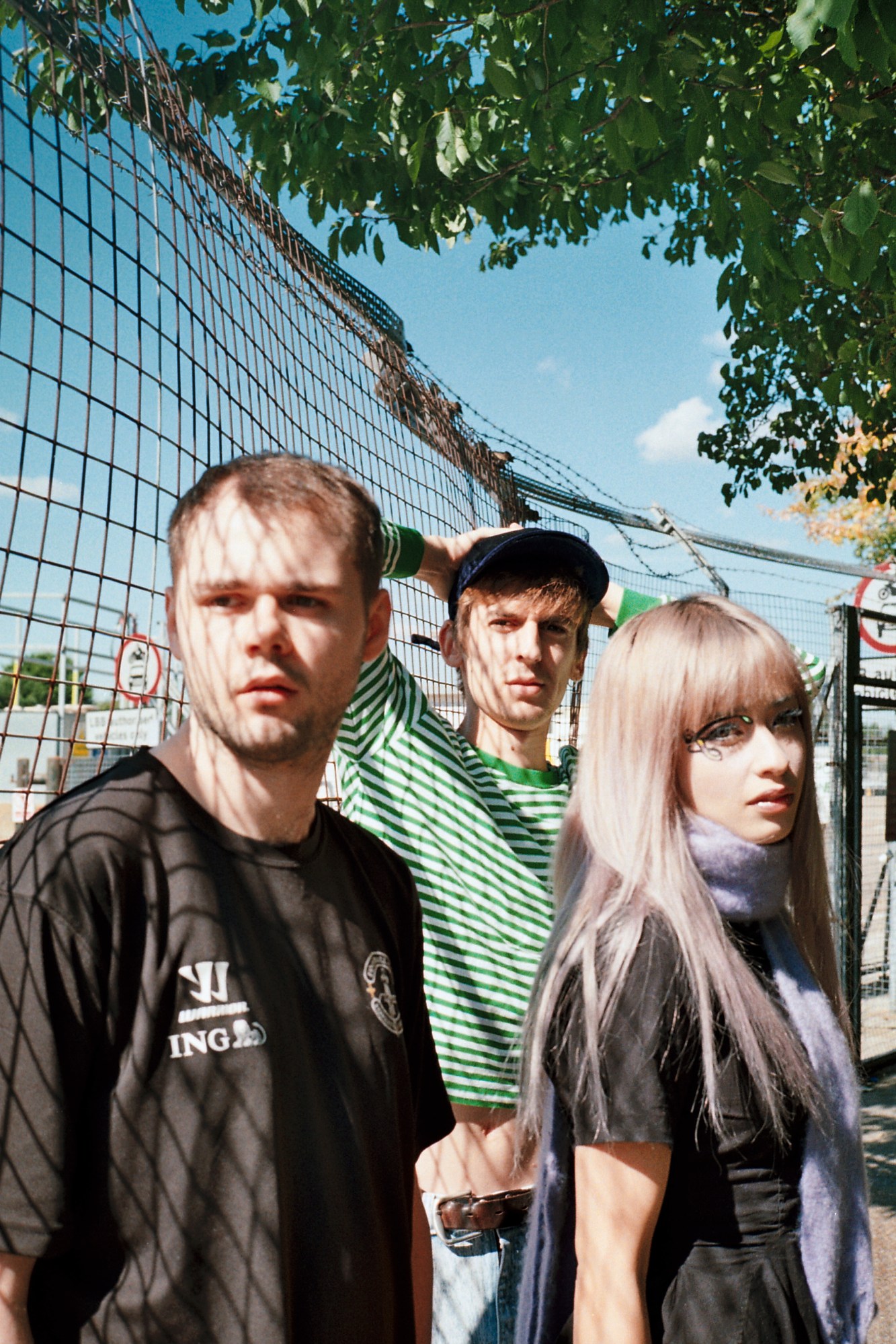After five years of making infectious bilingual bubblegum pop, Kero Kero Bonito has flipped the script. The London-based band surprised everyone earlier this month with the drop of a new album, Time ‘N’ Place, and not just because it was unannounced — the band had totally evolved its sound, too.
Some fans might have anticipated this sonic shift — KKB dropped an EP and singles earlier in the year that hinted at a noisier style. But now, in place of Gus Lobban and Jamie Bulled’s futuristic pop productions and Sarah Midori Perry’s English and Japanese rapping and singing, comes a whole new experimental sound.
This change was partly a reaction to grief. After the release of their second album, 2016’s ebullient Bonito Generation, each of the band members lost loved ones, and suddenly it no longer felt appropriate to play light-hearted music on laptops. So they started bashing away at bass, drums, and guitar for catharsis.
“All three of us went through stuff in our lives, and we wanted to use instruments that we could specifically hit or make a sound with,” Sarah explains on the phone from London. “We wanted something chaotic.”
KKB is currently on tour, along with guitarist James Rowland and drummer/synth player Jenny Walton. It’s a new era for the band, in both sound and configuration. At a recent sold-out show in New York, hits were given the rock treatment, creating seamless transitions between old and new songs. Sarah says, “Personally, for me, it’s my first time being in a band with instruments, so playing the shows with a full band — having a real drummer behind me — I can definitely feel the music more.”
Time ‘N’ Place is an album of chaos, but a carefully controlled one at that. The lead single, “Only Acting,” starts out as straightforward guitar-pop, and then crashes into psychedelic glitchy noise by the final chorus. However this isn’t by chance. Gus says that after writing pop songs for Bonito Generation the band wanted to break out and try something new. “We’re quite into songwriting and thinking about how that works,” he says. “I think it’s quite an arbitrary thing for a lot of bands, like ‘oh, well the chorus goes there…’ But we just thought ‘hey, let’s have some fun and do something kind of nuts!’”
It’s not the only jarring moment on Time ‘N’ Place. Final track “Rest Stop” ends abruptly and Sarah’s vocals are cut off, leaving you hanging on her final word. Gus says the song is about growing up, and the moment in your life where you stop to take stock. “I think people have a tendency to apply a lot of rationalized meaning to that kind of stuff, or a narrative, you know? But I think that’s a cool way to end that song, because actually there isn’t really a narrative to it, it’s just a mess, which I think sometimes life just is. It is just a conflation of very random things and maybe it feels a bit scary or maybe it feels good, but it might not actually intrinsically mean anything, you know?”
The sad events that preceded Time ‘N’ Place have clearly made KKB’s members more reflective — not only about who they are, but where they’re from. This extends to the album’s cover art, which, on first glance, appears like a close-up of a teenager’s bedroom floor, with its collage of candy wrappers, shoelaces, and chains. Gus says it actually represents a time capsule — that “quaint and slightly sad thing that humans do” — which is referenced in the song “Dear Future Self.”
“Physical objects and physicality in general is a big theme on the album,” says Gus, referring to the physical loss of the band’s loved ones, and the loss of physicality from our daily digitized lives. “It’s a contrast with the virtual mental space that we basically inhabit in 2018. I think we miss physical space a lot — and physical objects, physicality in general.”
This craving for a simpler way of life saw them channel their childhoods in the suburbs, which is why Gus says it’s a “very suburban” album. “It’s about our relationship to where we’re from and where we’re at. When we were growing up, the sound of the suburbs was guitar music — My Bloody Valentine, Late Of The Pier, CSS. When we were playing in our little garage band, that was the music we were trying to copy. But that’s not the sound of the suburbs anymore,” he says. “Now the sound of the suburbs would probably be trap. Embracing guitar music, I think, is symbolic of a kind of sound of the dead suburbs.”
KKB has always gone against the grain. Though it’s something that’s brought the band much acclaim, it now means momentarily leaving behind Sarah’s Japanese rapping and singing. On Time ‘N’ Place she sings solely in English. “I think maybe it goes hand in hand with us making a statement that’s a bit of a step [in a different direction]. I guess it avoids pigeonholing. But it’s not like we’ve abandoned that,” Gus says, suggesting the band hasn’t ditched its bilingual pop style for good. “There’s definitely stuff to come.”
One thing KKB will always have is positivity. For all the sadness that surrounds Time ‘N’ Place, the band retains the playful, positive vibe it has been celebrated for since the very first single, “Flamingo.” Sarah says, “I think the positivity definitely comes from who we are as people. There are dark things that we experience, but I think because we have experienced that, we know how great the light is. Experiencing the darkness definitely makes us cherish more of the light positivity in life.” If there’s one thing the world needs more of right now, it’s that positivity.
